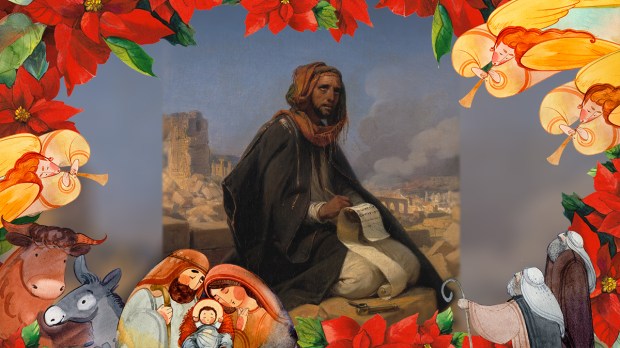It is appropriate that we should hearken to the voice of Jeremiah on this darkest day of the year, the winter solstice.
Jeremiah lived in the darkest of times, in days at least as dark as our own, and his voice was crying in the wilderness of a wasteland of disbelief. He should, therefore, be an inspiration to us, enkindling in our hearts an earnest aspiration to be as faithful and courageous as he was in times similarly dark.
Known as the weeping prophet, he was certainly the archetypal prophet of doom. Living at a time when the people of God had turned their back on the religion of their fathers to worship the false god of Baal, to whom they sacrificed their own children, Jeremiah condemned false prophets and foretold that Jerusalem would be destroyed as a punishment for the people’s apostasy. In addition to the destruction of Jerusalem, signifying the end of civilization, Jeremiah also prophesied famine, foreign conquest and finally exile for the unfaithful people of Israel.
Not surprisingly, this particular prophet was not too popular. There were plots to kill him and he was imprisoned and left to starve to death. Rescued on this occasion, he was imprisoned again and remained incarcerated until the fall of Jerusalem that he had prophesied.
It is easy to see parallels between Jeremiah’s heroic witness and the equally heroic witness of Christian martyrs throughout the centuries. And it is easy to see parallels between his time and ours.
A century ago, the poet T. S. Eliot had Jeremiah in mind when he spoke of his own times as a lifeless wasteland and of “voices singing out of empty cisterns and exhausted wells.” This was an allusion to the words from the Book of Jeremiah: “For my people have committed two evils; they have forsaken me, the fountain of living waters, and hewed them out cisterns, broken cisterns, that can hold no water.”
As it was in Eliot’s time a hundred years ago and in Jeremiah’s time 2,500 years earlier still, so it is today. We still live in a culture that idolizes false gods and that kills its own children. We follow false prophets and listen to voices singing out of empty cisterns, broken cisterns that can hold no water. We live in a wasteland, as did Eliot and as did Jeremiah. Some things never change. We live in a land of exile and a vale of tears. But there is a fountain of living waters in the midst of the desert. It is the oasis to be found in Bethlehem. We go on as pilgrims towards the light of the lengthening days to come and to the life-giving waters that wash away the darkness itself in the light and life of Christ.
~
[The Aleteia community is joining the journey of an Old Testament pilgrim each day this Advent, as they lead us to the Christ Child in this holy season. Find the daily reflections here.]

